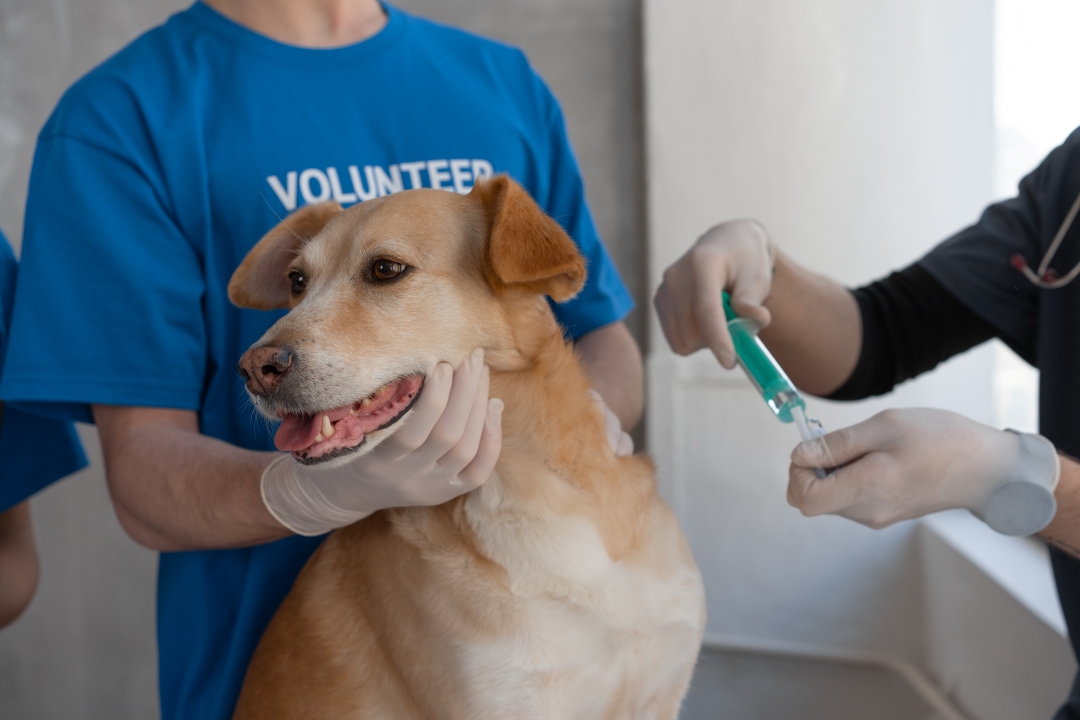
A dog undergoing treatment at a veterinary clinic.

I AM writing this week’s column with great trepidation knowing that the subject that I’m touching on might make me very unpopular with pet lovers, veterinarians and those organisations and societies set up to protect and safeguard their interests.
Firstly, let me qualify before I go any further.
I love animals and for a very long period of time, I have worked in an industry that promotes their welfare, relevance and reverence for all God’s creatures, especially those in the wild and more so, those classified as endangered species.
I have worked in the ‘animal and wildlife’ industry as a highly experienced film production services provider in which capacity for the past 36 years, since 1987, have personally been involved and, indeed, made my living from animals and wildlife besides other living beings.
I had, under our Scubazoo Images flag and my own personal Southeast Asia Film Locations, serviced countless international feature films, documentaries and commercials with production companies from the UK, the US, Canada, Australia, Japan, France and elsewhere.
I have worked with legends like Sir David Attenborough, David Suzuki and Austin Stevens.
At home, I have owned pet dogs and cats, aquarium fishes and live in an environment surrounded by wildlife of all forms – those that fly, walk and swim.
Having got that out of the way, my topic is simply to shine a light, or highlight an oddity in this current time and space within this little township of ours – of course, I shall mention no names and make no accusations, but treat this as a generalisation based on actual episodic facts and occurrence.
Last week I had an opportunity to make a simple straightforward comparison between what a general practitioner (GP) charges and what a veterinarian charges in Kuching, for the same ailment and similar treatment and medication.
To say my jaw dropped at the bill charged by the latter was an understatement!
The human had a stomach ailment and had been suffering diarrhoea and discomfort for at least 48 hours; the family dog, a non-pedigree of mixed breed (actually just a simple common house dog) showed no appetite and was suffering a superficial wound (could have sustained from a minor dogfight the night before). Bloodwork was undertaken.
The human’s bill came up to RM58 with medication, and the dog’s – it was up to RM557!
I happened to be with a group of friends and upon hearing this story, one of them said: “Well, you know it takes a lot longer for a veterinarian to become qualified to open his own clinic – and lesser number of years for the doctor!”
So I turned to my trusty friend Mr Google and did a search for precisely that difference: how long does it take for one to become a vet, versus that for a doctor, to practice in Malaysia?
My friend was very wrong – he had made a very false assumption that, I’m sure, was the usual reason used by the receptionists/assistants at many vet clinics when their customers had been stultified upon the presentation of their stupendous invoice for their pet’s treatment.
According to Google, it takes five years to obtain a degree in veterinary sciences in Malaysia, and one can become a fully-certified veterinarian in six years. Also in Malaysia, it takes eight to nine years for a fully-qualified medical doctor to practise and for him to become a specialist, it would take at least another two years.
So there goes another myth towards why vets are ‘allowed and qualified’ to charge 10 times more because they had studied, trained and qualified for it much longer than a GP.
What do I think? If you go through the register of both their medical associations (nowadays we do not have the benefit of the Yellow Pages anymore because no one bothers using landlines), you would also find that the list of medical doctors registered to practise is a lot longer than that of the list of vets – I would reckon 10 times longer.
One would also be able to notice that at the popular vet clinics, there would be at least two other vets and many more staff and assistants when you compare it to the GP’s clinic, which would usually have a skeleton staff of a cashier/receptionist and just a couple of assistants.
Vets would also have a lot more office space and require bigger holding areas for their ‘patients’, versus a GP’s usual standard three or four holding rooms, and a general waiting room.
So overall, the overheads for operating a vet clinic would be up to three or four times more.
The tools of the trade also differ as well as the risks undertaken by all the staff, as human patients do not drool or bite and can possibly endanger a staff’s life with the potential of being infected by rabies and other dreaded diseases by the ‘patient’. Unless a GP treats vampires, there is very little risk or threat from his human patient of being infected by anything other than coronavirus.
In my heading, I purposely used the word ‘over-pampering’ – I am a staunch believer that if you choose to keep any pet, you must be ready to be responsible for its well-being and its good health, as well as to ensure that it has opportunities for its own play space and is not confined 24/7 inside a cage or being leashed up.
I have also seen and am very much aware of those owners who are totally enamoured and subservient to their pets so much so that they are being also used as constant companions to accompany them everywhere – sometimes as a ‘show and tell’; sometimes as a ‘status symbol’; but also because they dread the thought of keeping their loved ones at home – alone and on their own.
To all that, I can only say ‘to each his own’, who am I to argue with that?
It is only when I do sometimes see owners who actually do over-pamper pets, sometimes to the detriment (or a better word – ignoring) those human beings for whom they should indeed show more love and adoration for, such as the younger and elderly family members who, I am sorry to say, do not seem to be given equal time nor similar ‘pampered’ treatment.
Sometimes I feel that these owners think nothing of splashing money on their pets, but appear hesitant to spend on family elders. If this perception of mine is correct, I feel extremely sad.
I must also mention that there were occasions when pets were being taken to places that they should never enter, eating spots and where there were small children at play.
Pets must and should be treated as just that – they are pets and should never be treated like humans – and devotion to them, no matter how much love we actually feel for them, has to be tempered with our human instincts that we must set our own personal priorities right.
Having said all that, I have found some great quotes on pets on the Internet to placate those I might have hurt with this piece today; here it goes: “In addition to love, companionship, and the emotional connection that humans crave, we actually change our actions when owning a pet. We do best medically and emotionally when we feel securely attached to another, because we’re mammals and that’s the way we’ve evolved.”
A Dr Fricchione had said that in December 2017.
I have a personal favourite quote that goes like this: “Animals are such agreeable friends – they ask no questions, they pass no criticisms. An animal’s eyes have the power to speak a great language. Until one has loved an animal, a part of one’s soul remains unawakened.”
Lovers of animals of the world – unite! Vive le cats and dogs everywhere!
A postscript to those vets out there – please don’t profiteer from us, the pet owners and lovers of the world!
